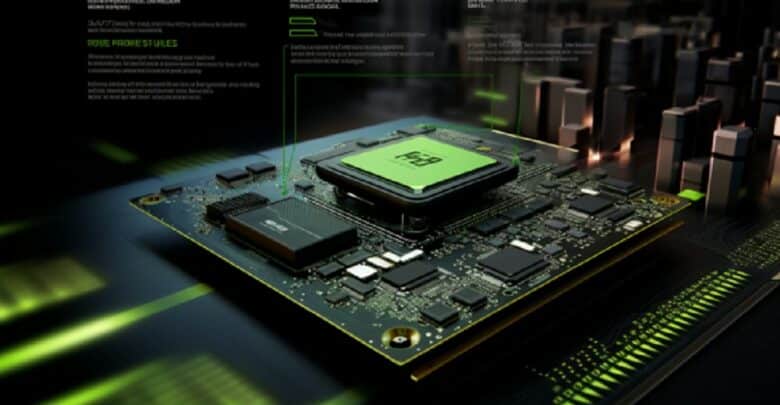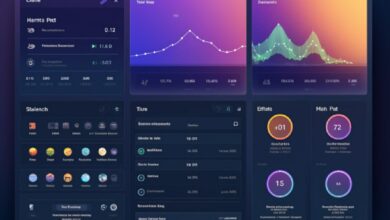Nvidia’s Stock Price Approaches Record High: Here’s Why

Nvidia’s H200 Advancement
Nvidia’s introduction of the H200 aims to revolutionize AI model training and deployment. It also represents a remarkable advancement from its predecessor, the H100, renowned for its contribution to powering OpenAI’s GPT-4.
The H200 features 141GB of next-generation HBM3 memory and facilitates efficient “inference,” enabling the utilization of large models post-training to generate text, images, or predictions. Its promised near-double output speed showcases a significant stride in AI processing capabilities, promising a more efficient and robust AI development and deployment solution.
Scheduled for release in the second quarter of 2024, the H200 would be an excellent competition for AMD’s MI300X GPU. Both chips boast enhanced memory features to accommodate extensive AI models, marking a pivotal phase in the evolution of AI hardware.
Strategic Approach by Nvidia
One notable aspect of Nvidia’s approach is its strategic design for backward compatibility with existing H100 setups. This foresight ensures a seamless transition for AI companies already invested in Nvidia’s previous model, showcasing Nvidia’s commitment to supporting its customer base.
Additionally, offering the H200 in various configurations caters to the diverse and evolving needs within the AI technology ecosystem. Despite Nvidia’s strides in AI hardware innovation, it faces challenges in light of new US export restrictions targeting high-end chips.
Approximately 20-25% of Nvidia’s data center revenue originates from China, making these restrictions impactful. These measures aim to curtail the utilization of AI technology for military advancements in China.
Consequently, Nvidia had to redirect its advanced systems to other markets and halt new AI chip orders from China, introducing fresh uncertainties and operational hurdles.
Impressive Market Performance
Nevertheless, the company’s stock has risen by over 230% in 2023 alone, projecting up to $16 billion in revenue for its fiscal third quarter. If this projection becomes real, it would represent a 170% increase from the previous year.
Furthermore, Nvidia’s stock price is on the verge of reaching its all-time high, of $502. It is approaching $486 as of November 13, reflecting an almost 250% increase since the beginning of 2023.
This upward trajectory signals investor confidence in Nvidia’s potential to navigate challenges and thrive in the competitive AI hardware market.
Google Takes Legal Action Against AI Scammers
Meanwhile, search engine behemoth, Google, has filed a lawsuit against three anonymous scammers for their creation and promotion of fake versions of Google’s AI chatbot, Bard. These scammers, referred to as “DOES 1-3” in the lawsuit, utilized Google’s trademarks, including “Google, Google AI, and Bard,” to deceive unsuspecting users into downloading malware onto their devices.
The lawsuit, initiated on November 13, alleges that these scammers employed deceptive tactics, presenting their fake advertisements as updates for Google’s AI chatbot Bard. One such tactic was luring users to download malware under the guise of free versions of Bard and other AI products.
Google provided several examples of deceptive social media pages and trademarked content mimicking Google’s products. The malicious links in these misleading advertisements also exploit users’ social media login credentials, mainly small-scale businesses.
Google emphasizes that these bad actors’ actions severely affect users’ security and privacy. Accordingly, it is seeking damages, attorney’s fees, injunctive relief, and the restitution of all profits obtained by scammers.
This lawsuit isn’t unexpected, given the significant rise in the global use of AI services, particularly chatbot services. Google’s Bard product attracts around 49.7 million unique visitors each month, indicating the substantial popularity and reliance on AI-driven services.
Similarly, OpenAI’s ChatGPT boasts over 100 million monthly users and nearly 1.5 billion website visitors.
AI Services And Legal Disputes
The increasing prominence and accessibility of AI services have also resulted in legal disputes involving major tech companies like OpenAI, Google, and Meta (the parent company of Facebook, Instagram, and WhatsApp). Earlier this year, Google faced a class-action lawsuit where eight individuals, representing millions of class members, accused the company of privacy and property rights violations.
The lawsuit stemmed from Google’s updated privacy policy, incorporating data scraping capabilities for AI training. However, this legal action by Google against the scammers demonstrates the company’s commitment to protecting its users and trademarks from malicious exploitation.
Additionally, it underscores the challenges tech companies face in safeguarding their AI technologies against fraudsters in an era marked by heightened digital interactions and reliance on AI-driven services.
Tokenhell produces content exposure for over 5,000 crypto companies and you can be one of them too! Contact at [email protected] if you have any questions. Cryptocurrencies are highly volatile, conduct your own research before making any investment decisions. Some of the posts on this website are guest posts or paid posts that are not written by Tokenhell authors (namely Crypto Cable , Sponsored Articles and Press Release content) and the views expressed in these types of posts do not reflect the views of this website. CreditInsightHubs is not responsible for the content, accuracy, quality, advertising, products or any other content or banners (ad space) posted on the site. Read full terms and conditions / disclaimer.





